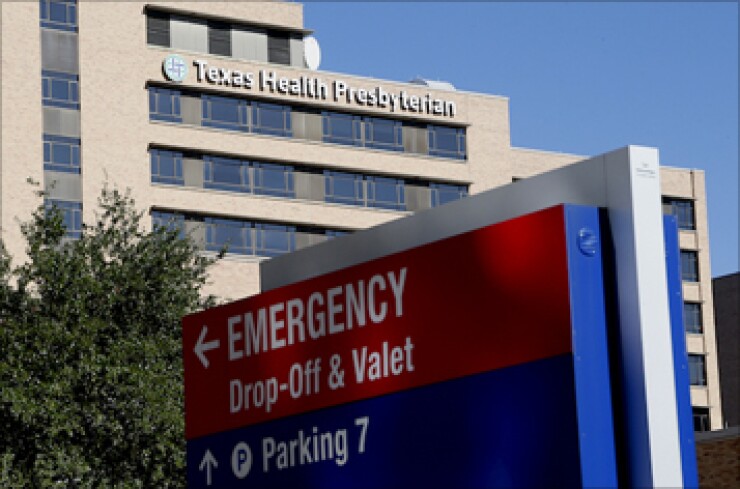
DALLAS — Standard & Poor's does not expect any near-term rating actions in the health care sector as a result of the Ebola situation, analysts said Wednesday.
"However, we recognize that preparedness will be an added financial expense for many providers and it is already affecting senior management time and energy," the ratings agency said.
The S&P statement on the Ebola crisis followed Moody's Investors Service decision to shift Texas Health Resources to its "developing" watch list from its previous "positive" outlook.
Texas Health Resources operates Texas Presbyterian Hospital in Dallas, where the nation's first Ebola patient, Thomas Eric Duncan, was treated and died and where two nurses who treated him, Nina Pham and Amber Vinson, contracted the disease and were transferred to other hospitals.
The Moody's Aa3 rating applies to about $1 billion of debt. S&P maintains a stable outlook on Texas Health Resources' AA rating.
Vinson traveled on a Frontier Airlines flight to Cleveland, causing those she came in contact with and airline passengers to be added to the disease monitoring list. Another Texas Presbyterian lab worker who processed some of Duncan's bodily fluids took a cruise that had to be interrupted when it was discovered that she had been involved in the Duncan case. That lab worker has reportedly tested negative for the disease.
On the Municipal Securities Rulemaking Board's EMMA website, Texas Health Resources posted a "
"Although we had begun our Ebola preparedness activities, our training and education programs had not been fully deployed before the virus struck," THR chief executive Barclay Berdan wrote. "In short, despite our best intentions and skilled medical teams, we did not live up to the high standards that are the heart of our hospital's history, mission and commitment."
According to S&P's analyst Martin Arrick, credit impact on the health-care sector could be "modest and incremental" if the spread of the virus is contained.
If the virus does spread in this country, a whole series of unknowns make the impact much harder to anticipate.
"What additional costs will be required in equipment, training and protocols for patients who present with Ebola or suspected Ebola? Will hazardous waste disposal problems emerge? Who pays for it? Is the cost borne by each individual hospital, the local government, or will federal dollars be available?" he wrote for S&P.
"Will hospitals face a stigma from treating patients, potentially driving other patients away from the facility?" S&P's statement said. "Similarly, will an Ebola stigma create personnel shortages of nurses and other health care professionals if they choose not to be present if Ebola patients show up at their facility?
"If providers are forced, or choose, to forego business as they manage this disease, will business interruption insurance cover these costs? Will there be lawsuits for deaths and the potential spread of the disease? Will malpractice costs go up?"
Texas Gov. Rick Perry, criticized for leaving the country amid the health crisis in his state, announced on Oct. 21 the creation of an Ebola treatment and infectious disease bio containment facility in North Texas.
Creation of such facilities was among the first recommendations made by the governor's recently named Texas Task Force on Infectious Disease Preparedness and Response in order to better protect health care workers and the public from the spread of pandemic diseases.
Presbyterian saw its revenue decline by $8.1 million or 25.6% in the first 20 days of October, according to financial disclosures. Emergency room visits fell by 2,336, or 53.3%, and operating surgeries declined by about 165 cases, or 25%. The daily patient count fell by 21.1%, from 428 to 337.
From Oct. 12 to Oct. 20, Presbyterian did not accept ambulance cases, diverting them to other hospitals, the disclosure said.
Texas Health Resources "has not seen a decline in volumes/revenues at its other hospital facilities as a result" of the Ebola cases, THR said.
THR said the network's insurance coverage was adequate for any liabilities and that "no legal claims have been filed to date." THR has "sufficient liquidity to cover any losses that might exceed coverage limits and declines in volume" at Presbyterian Dallas, according to the financial statement.





